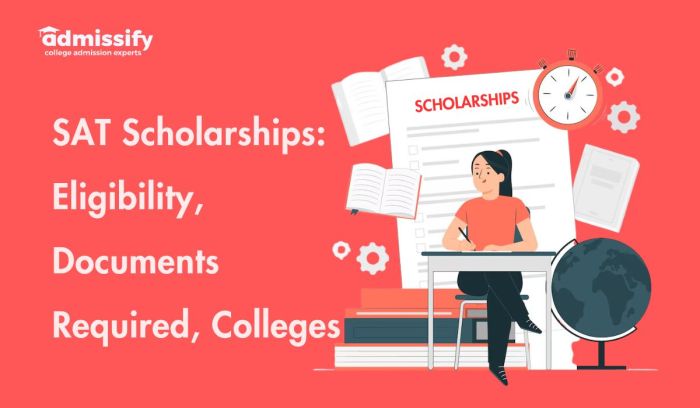Scholarships in the USA That Dont Require SAT or ACT Opportunities Abound
Scholarships in the USA That Don’t Require SAT or ACT are a beacon of hope for students seeking financial aid for higher education without the stress of standardized tests. These scholarships come in various forms, catering to diverse talents and backgrounds, making college accessible for many. Not only do they alleviate the financial burden, but they also open doors for students who excel in areas beyond academics, such as community service, creativity, and leadership.
Understanding the landscape of these scholarships is crucial for students. With a mix of merit-based and need-based options, along with specific eligibility criteria, students can find opportunities that align with their strengths. The application process is straightforward, and with the right strategies, students can enhance their chances of securing funding for their educational journey.
Overview of Scholarships in the USA
Scholarships are financial awards granted to students to help cover the costs of higher education. They are typically awarded based on a variety of criteria, which may include academic achievement, athletic ability, artistic talent, or financial need. Scholarships play a significant role in making education accessible, especially for students who may otherwise face financial barriers. This overview focuses on scholarships in the USA, particularly those that do not require standardized test scores like the SAT or ACT.Scholarships that do not require SAT or ACT scores offer several advantages, particularly in today’s evolving educational landscape.
These scholarships often aim to broaden access to education for diverse student populations. By eliminating the need for standardized testing, these awards allow students to showcase their potential through other means, such as personal statements, letters of recommendation, or extracurricular involvement. This approach not only reduces stress associated with standardized testing but also promotes a more holistic evaluation of a student’s capabilities and achievements.
Types of Scholarships
The landscape of scholarships can be broadly categorized into two main types: merit-based and need-based scholarships. Understanding the distinctions between these categories helps students identify which opportunities align with their individual circumstances and strengths.Merit-based scholarships are awarded to students based on their academic performance, talents, or achievements. These scholarships recognize excellence in various areas such as academics, sports, or the arts.
For example, the National Merit Scholarship Program awards students for their exceptional PSAT scores, while many universities offer scholarships to incoming students based on high school GPA and extracurricular achievements. On the other hand, need-based scholarships are designed to support students who demonstrate financial need. These scholarships take into account the student’s family income and financial situation, ensuring that those who may struggle to afford tuition can still pursue their education.
A well-known example is the Federal Pell Grant, which provides financial aid to low-income undergraduate students.
- Merit-Based Scholarships: Recognize outstanding academic and extracurricular achievements.
- Need-Based Scholarships: Aim to provide financial assistance based on the student’s economic background.
Understanding these distinctions is crucial for students and families navigating the scholarship application process, as it allows them to target their efforts effectively and enhance their chances of receiving funding for their educational pursuits.
Types of Scholarships Available
Numerous scholarships in the USA do not require standardized test scores like the SAT or ACT. These scholarships cater to a diverse range of students, making higher education more accessible. Understanding the different types of scholarships available can help prospective students find financial support that aligns with their unique qualifications and aspirations.Various scholarships target specific demographics, academic achievements, or fields of study.
Here, we detail several types of scholarships that do not rely on standardized test scores and provide specific examples offered by universities and organizations across the country.
Merit-Based Scholarships
Merit-based scholarships reward students for their academic achievements, talents, or special skills. These scholarships often consider a student’s GPA, extracurricular activities, or leadership roles rather than standardized test scores.
- University of Florida’s Academic Achievement Scholarship: Eligibility is based on rigorous coursework and GPA. Award amounts range from $2,000 to $10,000 per year.
- Mount Mary University Chancellor’s Scholarship: This scholarship is available for incoming freshmen with a strong academic background and leadership experience, offering up to $10,000 annually.
Need-Based Scholarships
Need-based scholarships assist students who demonstrate financial need, ensuring that financial constraints do not hinder their educational pursuits. These scholarships assess family income and other financial factors.
- Pell Grant: Although technically a grant, the Pell Grant is a need-based financial aid program that provides up to $6,495 for students based on their financial situation.
- University of California Blue and Gold Opportunity Scholarship: This scholarship covers tuition and fees for California residents whose family income is below $65,000.
Diversity Scholarships
Diversity scholarships aim to promote inclusivity and support underrepresented groups in higher education. These scholarships focus on students’ backgrounds, including ethnicity, gender, and unique life experiences.
- Jack Kent Cooke Foundation College Scholarship: This scholarship supports high-achieving students with financial need, offering up to $40,000 annually to cover college expenses.
- United Negro College Fund (UNCF) Scholarships: UNCF offers multiple scholarship opportunities for African American students attending college, with varying amounts based on need and academic performance.
Field-Specific Scholarships
Field-specific scholarships are designated for students pursuing a particular area of study or career path. These scholarships encourage students to enter fields that may be in high demand or lacking in diversity.
- American Psychological Association (APA) Scholarships: Available for students pursuing degrees in psychology, offering various scholarships based on merit and financial need, with amounts typically ranging from $1,000 to $5,000.
- National Science Foundation Graduate Research Fellowship: This prestigious fellowship supports graduate students in NSF-supported science, technology, engineering, and mathematics disciplines, offering an annual stipend of $34,000 plus additional funds for tuition.
Community Service Scholarships
Community service scholarships recognize students who actively engage in their communities and contribute to social causes. These awards often consider a student’s volunteer experience instead of standardized test scores.
- The Prudential Spirit of Community Awards: This program honors young volunteers across the U.S. and provides scholarships ranging from $1,000 to $5,000 to students who have demonstrated exemplary service.
- McDonald’s HACER National Scholarship: This scholarship supports Hispanic students who are involved in community service, with awards up to $100,000 over several years.
| Scholarship Name | Eligibility Criteria | Award Amount |
|---|---|---|
| University of Florida’s Academic Achievement Scholarship | High GPA and rigorous coursework | $2,000 to $10,000 per year |
| Pell Grant | Demonstrated financial need | Up to $6,495 |
| Jack Kent Cooke Foundation College Scholarship | High-achieving students with financial need | Up to $40,000 annually |
| Prudential Spirit of Community Awards | Students with community service involvement | $1,000 to $5,000 |
Eligibility Criteria for Non-Test Scholarships

Source: collegerealitycheck.com
Many students today seek scholarships in the USA that do not require SAT or ACT scores. Understanding the eligibility criteria for these scholarships is essential to enhance your chances of securing financial aid for your education. Common requirements often focus on academic performance, involvement in extracurricular activities, and a commitment to community service, reflecting a well-rounded student profile.Scholarships not based on standardized test scores typically consider various assessment factors.
A high GPA is often a fundamental requirement, as it demonstrates academic achievement and dedication to studies. Additionally, involvement in extracurricular activities such as clubs, sports, and arts can significantly bolster a student’s application. These activities showcase leadership skills, teamwork, and personal interests, which are all attractive qualities to scholarship committees. Community service also plays a vital role, as it indicates a student’s commitment to giving back to society and developing valuable life skills.
Factors Influencing Eligibility, Scholarships in the USA That Don’t Require SAT or ACT
The following factors are important for students aiming to enhance their scholarship applications. Focusing on these aspects can significantly improve your chances of receiving non-test scholarships:
- GPA: Maintain a strong academic record, ideally above 3.0, to meet most scholarship requirements.
- Extracurricular Activities: Participate in clubs, sports, or arts that reflect your passions and leadership abilities.
- Community Service: Engage in volunteer work that demonstrates your commitment to helping others and developing skills.
- Personal Statements: Write compelling essays that reflect your experiences, motivations, and future aspirations.
- Letters of Recommendation: Obtain strong endorsements from teachers or community leaders who can vouch for your character and achievements.
- Interviews: Prepare for possible interviews by articulating your goals and experiences confidently.
Focusing on these tips can provide a well-rounded view of your qualifications and help you stand out in the scholarship application process. Scholarships can be highly competitive, so it is essential to present yourself as a strong candidate through various facets of your profile.
Application Process for Scholarships
Applying for scholarships that do not require SAT or ACT scores can be a straightforward process if you know the necessary steps. Many institutions and organizations are keen to support students based on their merits instead of standardized test scores, making it essential to understand how to navigate the application procedure effectively.The general steps involved in applying for these scholarships typically include researching available opportunities, preparing necessary documents, completing applications, and submitting them before the deadlines.
Each scholarship may have specific requirements, but a few common elements are usually present across the board.
Steps to Apply for Scholarships
To ensure a smooth application process, follow these key steps:
1. Research
Start by identifying scholarships that align with your background, interests, and academic goals. Use scholarship search engines, school resources, and community organizations to find options.
2. Prepare Documents
Gather all necessary documentation, such as transcripts, personal statements, and financial information.
3. Complete Application Forms
Fill out the scholarship applications with accurate information, ensuring you follow any specific instructions provided.
4. Submit Applications
Review your applications for completeness and accuracy before submitting them by the designated deadline.
Checklist of Documents for Scholarship Applications
Having the right documents prepared is crucial for a successful scholarship application. Here’s a checklist of commonly required materials:
- Academic transcripts
- Personal statement or essay
- Financial aid information (if required)
- Resume or curriculum vitae
- Letters of recommendation
Each scholarship may have specific documentation requirements, so be sure to read the guidelines carefully.
Importance of Recommendation Letters
Recommendation letters can significantly enhance your scholarship application by providing insight into your character, accomplishments, and potential. Select recommenders who know you well and can speak positively about your skills and experiences.To obtain strong recommendation letters, consider the following strategies:
Identify Appropriate Recommenders
Choose teachers, mentors, or employers who can attest to your qualifications and character.
Request Early
Give your recommenders ample time to write the letters, ideally at least two weeks before the application deadline.
Provide Relevant Information
Share your resume, details about the scholarship, and specific points you’d like them to highlight to help them write a more personalized letter.By understanding the application process and preparing effectively, you can increase your chances of securing scholarships that support your educational journey without the need for standardized test scores.
Scholarships by Field of Study

Source: admissify.com
Scholarships tailored to specific fields of study can significantly ease the financial burden on students pursuing their academic and career aspirations. Many scholarship opportunities are available for various disciplines, allowing students to focus on their interests without the added pressure of standardized tests like the SAT or ACT. Different academic majors often have unique funding sources that cater to their specific requirements.
This section explores scholarships for various fields of study, including the application processes and notable success stories of recipients who excelled academically and financially through these opportunities.
Scholarships Categorized by Discipline
Understanding the types of scholarships available by major can help students navigate their options more effectively. Below is a table that categorizes scholarships by discipline, outlining key details about eligibility and the application process.
| Field of Study | Scholarship Name | Eligibility Criteria | Application Process |
|---|---|---|---|
| Engineering | National Society of Professional Engineers Scholarship | Undergraduate engineering students; GPA of 3.0+ | Online application, recommendation letter required |
| Arts | Art Schools Network Scholarships | High school seniors pursuing visual/performing arts | Portfolio submission, online application |
| Healthcare | Healthcare Professionals Scholarship | Students enrolled in healthcare programs; community service required | Application form and proof of volunteer hours |
| Business | Entrepreneurship Scholarship | Students with a business idea; no GPA requirement | Submit business plan and video presentation |
| Education | Future Educators Scholarship | Students majoring in education; personal essay required | Online application; transcript submission |
Success stories highlight the transformative impact of these scholarships. For instance, Maria, an engineering major, won the National Society of Professional Engineers Scholarship, allowing her to focus on her studies without the stress of financial burdens. She now works as a structural engineer, attributing her success to the support she received during her education. Similarly, James, a budding artist, gained access to top-tier art schools through the Art Schools Network Scholarships.
His journey exemplifies how targeted funding can make a significant difference in students’ lives.These examples illustrate the importance of seeking out scholarships specific to one’s field of study, reinforcing the notion that financial assistance tailored to academic pursuits can lead to successful and fulfilling careers.
Resources for Finding Scholarships
Finding scholarships that don’t require standardized testing can be a game-changer for many students. Fortunately, there are numerous resources available to help students locate these financial opportunities. From dedicated scholarship databases to the invaluable advice of school counselors, students have multiple avenues to explore. This section will cover various resources and effective strategies for finding scholarships tailored to your needs.
Websites and Databases for Scholarships
Numerous websites and databases focus specifically on scholarships that do not require SAT or ACT scores. Utilizing these platforms can streamline the search process and help you discover opportunities that fit your profile.
- Fastweb: Fastweb is one of the largest and most comprehensive scholarship search engines. It allows students to create a personalized profile and matches them with scholarships based on their background and interests.
- Cappex: Cappex not only offers scholarship listings but also provides college reviews and admission advice, helping students make informed decisions.
- Niche: Niche offers a unique platform for students to find scholarships and college reviews. They feature scholarships based on specific criteria, making it easier to find options without testing requirements.
- College Board Scholarship Search: This tool allows students to search for scholarships based on various criteria. It also includes filters for those specifically seeking schools that don’t require standardized tests.
- Peterson’s: Peterson’s is a well-known resource for college planning and offers a scholarship search feature that includes various non-test scholarships.
The Role of School Counselors
School counselors serve as a vital resource in the scholarship search process. They are equipped with knowledge about local, state, and national scholarship opportunities and can provide personalized assistance to students. Counselors often have access to databases and information that may not be readily available online, ensuring that students receive guidance tailored to their specific academic and personal circumstances.
- Counselors can help identify scholarships that align with a student’s interests and background.
- They may have insights into less-publicized local scholarships offered by community organizations and businesses.
- Counselors can also assist in reviewing applications and personal statements, ensuring they meet scholarship requirements.
Tips for Conducting Effective Online Scholarship Searches
When searching for scholarships online, it’s crucial to employ effective strategies to maximize your results. The following tips can enhance your search process and increase your chances of securing funding.
- Start Early: Begin your scholarship search as early as possible to avoid missing deadlines and to have ample time to prepare your applications.
- Keep Organized: Create a spreadsheet to track scholarship deadlines, requirements, and application statuses to stay on top of your applications.
- Use Specific s: When searching online, use targeted s such as “no SAT scholarships,” “test-optional scholarships,” and “merit-based scholarships” to refine your results.
- Follow Social Media: Many organizations and scholarship providers share opportunities on their social media channels. Following these accounts can keep you informed about new scholarships.
- Network: Connect with peers, teachers, and community members to learn about scholarships that may not be widely advertised. Word-of-mouth referrals can often lead to hidden opportunities.
Addressing Common Misconceptions
Many students and families hold misconceptions about scholarships that do not require standardized test scores like the SAT or ACT. These myths can hinder access to financial aid opportunities that could significantly reduce educational costs. Understanding these misconceptions is essential for students seeking to maximize their scholarship potential and make informed decisions about their academic journey.One prevalent myth is the belief that test-optional scholarships are only available to students with poor standardized test scores.
In reality, test-optional scholarships are designed to broaden access to financial aid for a diverse range of applicants. This approach recognizes that standardized tests do not fully represent a student’s capabilities, achievements, or potential. Consequently, many institutions are moving towards a more holistic evaluation of candidates, focusing on academic performance, extracurricular activities, leadership experiences, and personal essays.
Perceptions of Test-Optional versus Traditional Scholarships
The differences in perceptions between test-optional and traditional scholarships can influence how students approach their college funding strategies. While traditional scholarships often place heavy emphasis on standardized test scores, test-optional scholarships prioritize a broader assessment of student attributes. Some key points regarding these perceptions include:
- Myth of Inferiority: Many believe that scholarships without test requirements are less prestigious. However, numerous well-respected institutions now offer robust test-optional programs, demonstrating a commitment to inclusive education.
- Misunderstanding of Eligibility: Students may think that by applying for test-optional scholarships, they are limiting their opportunities. On the contrary, these scholarships can open doors to a wider array of funding options based on diverse achievements.
- Focus on Holistic Review: Test-optional scholarships often emphasize a student’s overall profile, including grades, recommendations, and personal qualities, leading to a more equitable assessment than solely relying on test scores.
Changing the mindset surrounding scholarships requires students to embrace the concept of holistic evaluation and recognize the value of their unique experiences and qualifications. By focusing on their strengths and achievements, students can better position themselves for success in obtaining financial aid. Recognizing the importance of a well-rounded application encourages students to highlight their experiences through essays and interviews, showcasing their skills and character in ways that standardized tests do not capture.
This shift not only enhances their scholarship prospects but also fosters personal growth and confidence in their academic journey.
“A student’s worth cannot be defined by a single test score; it encompasses a myriad of experiences, achievements, and potential.”
Success Strategies for Winning Scholarships
Successfully securing a scholarship can significantly ease the financial burden of higher education. To stand out in a competitive pool of applicants, it’s essential to adopt effective strategies that enhance your application, particularly your essays and interviews. By mastering these elements, you significantly increase your chances of being awarded a scholarship.
Strategies for Writing Winning Scholarship Essays
A well-crafted scholarship essay is a powerful tool that can set you apart from other candidates. Your essay should reflect your values, aspirations, and unique experiences. Here are some key strategies to consider:
Understand the Prompt
Carefully read the essay prompt and ensure that your response directly addresses the question or theme posed by the scholarship committee.
Be Authentic
Share your personal story and experiences. Genuine narratives resonate more with reviewers than generic statements.
Showcase Your Achievements
Highlight your accomplishments and skills, using specific examples that demonstrate your capabilities and character.
Organize Your Thoughts
Structure your essay with a clear introduction, body, and conclusion. Use paragraphs to separate different ideas and maintain coherence.
Edit and Proofread
Always review your essay multiple times. Look for grammatical errors and ensure that your arguments flow logically. Consider seeking feedback from teachers or peers.
Preparing for Scholarship Interviews
Interviews are often a crucial part of the scholarship selection process. Being well-prepared can help you present yourself confidently and effectively. Here are steps to prepare:
Research the Scholarship Organization
Understand the mission and values of the organization offering the scholarship. This knowledge can help you align your responses to their goals.
Practice Common Interview Questions
Familiarize yourself with typical scholarship interview questions, such as your career goals, community involvement, and reasons for applying.
Dress Appropriately
First impressions matter. Choose professional attire that reflects respect for the opportunity.
Prepare Questions
Have thoughtful questions ready to ask the interviewers. This shows your interest and engagement.
Follow Up
After the interview, send a thank-you email to express your appreciation for the opportunity to interview.
Do’s and Don’ts in the Scholarship Application Process
Navigating the scholarship application process can be daunting. Understanding what to do and what to avoid can streamline your efforts and enhance your application. Here are some essential do’s and don’ts:
Do’s
- Start early to give yourself plenty of time to gather materials and write essays.
- Carefully follow all instructions provided in the application guidelines.
- Gather strong letters of recommendation from individuals who know you well.
- Be honest in your application; integrity is crucial.
- Seek feedback and revise your application materials as necessary.
Don’ts
- Don’t rush your application; take the time to ensure it is complete and polished.
- Don’t use clichéd phrases or generic content in your essays.
- Don’t ignore deadlines; late applications are often disqualified.
- Don’t hesitate to ask for help if you’re unsure about any part of the process.
- Don’t be discouraged by rejection; persistence is key to finding success.
Conclusive Thoughts

Source: ngschoolboard.com
In summary, scholarships in the USA that don’t require SAT or ACT scores present a wealth of opportunities for aspiring students. By understanding eligibility requirements, exploring various types of scholarships, and employing effective application strategies, students can overcome financial hurdles and focus on their academic goals. With determination and the right resources, the path to higher education is more attainable than ever.
Question & Answer Hub: Scholarships In The USA That Don’t Require SAT Or ACT
What types of scholarships are available without SAT or ACT scores?
There are merit-based, need-based, and specific scholarships related to fields of study that do not require standardized test scores.
Can international students apply for these scholarships?
Yes, many scholarships are open to international students, but eligibility criteria can vary by scholarship.
How can I find scholarships that don’t require standardized tests?
Search online databases, check with school counselors, and explore college websites for lists of available scholarships.
Do I need to write an essay for these scholarships?
Most scholarships will require an essay, which is an opportunity to showcase your personality and achievements.
Are there scholarships specifically for community service?
Yes, many scholarships prioritize community involvement and service as part of their eligibility criteria.









